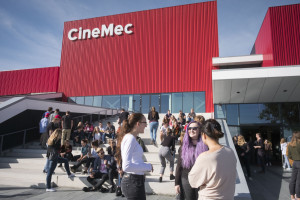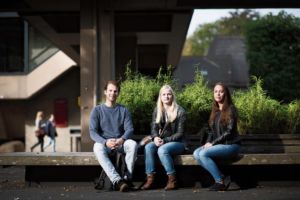Limits to growth (5): The explosion of psychology in 2016
-
 Illustratie: Ivana Smudja
Illustratie: Ivana Smudja
From 288 first-year students to 1800 preliminary applications a year later. In 2016, ‘all hell broke loose’ at the psychology department, which found itself facing a tsunami of first-year students. What caused this wave, and what can the university learn from it when it comes to keeping its own growth in check? A reconstruction.
‘Nijmegen psychology students attend lectures in a mega-cinema,’ the Algemeen Dagblad headlined in June 2016. Nijmegen’s decision to teach in a cinema made the national news. The psychology department was forced into this unconventional last-resort solution when faced with a tsunami of preliminary applications in the spring of 2016, after abolishing the numerus fixus (restricted student intake) and launching an English-language Bachelor’s programme. Having started 2015 with 288 first-year students, the department was suddenly faced with 1800 applications, a fivefold increase. The only option that came even close to the room size required was the Expo Theater of the CineMec (now Pathé) cinema in Lent, with its 1,000 seats.
The tempestuous growth spurt of the psychology programme in 2016 is the most extreme example of what can happen when a university lets everything go in the fight for prospective students. What exactly happened during this period? A reconstruction.
Limits to growth
In the coming weeks, Vox will highlight the steady growth of Radboud University. This is the fifth article in the series.
1. The growing pains of the university
2. Active student life under pressure
3. Fighting for office space
4. The sports centre is bursting at the seams
5. The explosion of psychology in 2016
6. Is the campus still easily accessible?
7. Lecture halls full of unhappy students
8. Student recruitment without growth ambitions
Prior to 2016, the number of first-year students at the department had long been constant, fluctuating between 300 and 400. After 2013, however, the intake rate dropped for two consecutive years, reaching a low point of 288 in 2015. This was partially due to the growing popularity of psychology programmes in Rotterdam and Maastricht, among other things due to their having introduced a Bachelor’s programme taught in English. ‘This decrease meant we suddenly faced a budget deficit of €350,000,’ Ruud Meulenbroek, who at the time had only just succeeded Daniël Wigboldus as director of the psychology programme, explains. Something had to change.
And change it did. ‘We refreshed our curriculum, and introduced two other major changes,’ says Meulenbroek. In the 2016-2017 academic year, the fixus was abolished, so students no longer had to fear missing out. Also, an English-language track was added to the Bachelor’s programme, alongside the Dutch one. Meulenbroek: ‘At the time, there was a lot of pressure from the Executive Board to launch English-language Bachelor’s programmes.’
Worst-case scenario
No sooner said than done. Until April 2016, when it suddenly transpired that there were 1,800 preliminary applications for psychology – six times more than the number of first-year students in 2015. ‘That was when all hell broke loose,’ Dennis Schutter, the lecturer responsible for teaching the programme’s introductory course at the time, remembers. ‘We immediately started preparing for the worst-case scenario, in case all those students really did end up enrolling.’ The consequences could barely be fathomed: six times more examination papers to correct, six times more internships to find and supervise. And that for at least three years, the full duration of the Bachelor’s programme. It was not as if the programme could just open an extra can of lecturers, let alone find the funds for it – in the university funding model of the time, income from extra students only became available a year later.

People panicked, the professor says, but there was also a sense of solidarity. ‘We were absolutely committed to making it happen.’ The most urgent problem was the logistics: the largest lecture hall on campus, in the Grotius building, could only accommodate 500 students. Schutter: ‘At some point, Ruud (Meulenbroek, Eds.) walked into my office, and said: You’re going to teach in CineMec. My immediate response was: Wow! But it was a very expensive emergency solution, of course.’ Meulenbroek organised shuttle buses to transport students from the campus to the Lent cinema and back.
In the end, a total of 616 Nijmegen first-year students ended up enrolling in the Dutch and English tracks in 2016. Still double the number of the previous year, but substantially less than feared.
This was due to a number of causes. One was that students sometimes apply for two programmes, and only decide at the last moment which one to enrol in. Some of these students may end up opting out of psychology. Or they enrol in the same programme at different universities and end up going elsewhere.
With more than 600 first-year students, the Expo Theatre was still jam-packed for the opening lecture, remembers Schutter. ‘Quite a change from CC1, isn’t it? I feel like I’m giving a TED talk,’ he told Vox at the time. A TED talk that he had to give twice: once in English, and once in Dutch. But after three weeks or so, Schutter was able once again to teach in a lecture hall on campus. ‘The number of students attending the lectures in CineMec dropped very quickly.’ He laughs: ‘Maybe students thought it was too far to travel so early in the morning.’
In the end, the extra teaching load generated by this massive group of students was one of the reasons for Schutter’s decision to switch to Utrecht University, where he is now Professor of Experimental Psychology. ‘I ended up teaching three courses for that cohort. The whole thing was kind of impossible; even the number of emails I was getting from students was insane.’ Nor did he like the pressure this unavoidably put on the quality of his teaching. ‘At meetings with the teaching team, people would say: adequate is good enough.’
Few researchers would willingly choose such a heavy teaching load, says Schutter. ‘I see the same thing here in Utrecht. We sometimes have vacancies for Assistant Professor positions with a teaching load of 70% to 80%. No one ever applies for these positions.’
Policy of disincentive
But the other factor that played a clear role, was the active policy of disincentive implemented by the Nijmegen programme in the spring of 2016. Some prospective students received an email with a negative study choice recommendation, signed by programme director Meulenbroek. This recommendation was based on data the students had entered in the Studiekeuzecheck; an online screening tool offered by the university. As a result, some retracted their enrolment in Studielink.
Popular among German students
In practice, the international classroom that the programme had hoped to create with its English track mostly turned out to be a Deutschklasse. In 2016, three in five first-year psychology students came from Germany, compared to barely 6% from other countries. One third was Dutch. Over the years, this ratio has reversed. This year, three in five first-year students are Dutch. Germans represent 28.5% of incoming students, while over 10% come from elsewhere.
Psychology has always been popular among German students, even before internationalisation. In 2012, they represented 44% of the cohort, despite being required to learn enough Dutch to be able to follow the programme. One of the reasons for this popularity is that in Germany, psychology programmes have always been bound to a strict numerus fixus. As a result, German students come to the Netherlands to avoid being turned down.
This kind of negative study recommendation may have been in line with the university’s motto of helping ‘every student end up in the right place’, but many students were not impressed. Tim Eeftinck Schattenkerk (30) was one of them. In early June 2016, the programme emailed him to inform him that they were under the impression that Eeftinck Schattenkerk’s study choice was ‘not judicious and fitting enough,’ and that he was ‘at risk of dropping out’. ‘We urge you to reconsider your choice of study and opt for a different programme.’
Eeftinck Schattenkerk, who has since graduated in psychology, was not amused. ‘It came across as a strong disincentive tool,’ he says, looking back. ‘As if there had been some kind of decentralized selection. They even wanted me to write a 500-word essay on why I was suited for the programme. But there was no selection; on the contrary, the numerus fixus had just been abolished. I knew my rights, and I knew they weren’t allowed to impose these kinds of conditions.’
‘It didn’t feel like a warm welcome’
But Eeftinck Schattenkerk’s choice for Nijmegen had been a very conscious one, and he refused to give in. Still, the experience left him with mixed feelings as he began his psychology studies. ‘It didn’t feel like a warm welcome. If anything, it made me feel as if I had to be on guard to make sure my rights as a student were respected at Radboud University.’
A narrow escape
In the end, the psychology department got away with a narrow escape. In the following year, 2017, the numerus fixus was reinstated, this time at national level. Meulenbroek: ‘I had to really fight for it in the Kamer Psychologie, the national consultative body for Dutch psychology programmes. But it was the only way to avoid a waterbed effect.’
The fixus ‘saved us’, the professor says. It led to student numbers dropping down to normal levels of around 400. These days, the maximum number of first-year students is set at 600. And clearly, the university needs to create enough room in its lecture halls to accommodate them all. This was no problem during the pandemic, thanks to online teaching. Next year, students will probably have to be divided into parallel lecture halls in the Montessori building or elsewhere on campus, says Rob Holland, who succeeded Meulenbroek as programme director last year.
A numerus fixus is still very much needed, says Holland. ‘Last year, we had 1,300 preliminary applications.’ To decide who among these prospective students will be granted admission, the programme uses a selection procedure – a formal one this time – based on factors such as motivation. This selection ultimately results in a ranking. But doesn’t this boil down to selecting the students who are best able to sell themselves? Holland does not think so. ‘I was also sceptical about the ranking at first, but it turns out to predict quite accurately how well a student will do in the study programme. And school examination grades are also taken into account.’
Cash cow
What lessons can the university draw from the growing pains of the psychology programme? Change things step by step, both Holland and Meulenbroek say. The latter: ‘It would have been better if we’d spread abolishing the numerus fixus and introducing an English track over two years.’ Holland adds: ‘Also, when a university forces this kind of track from the top down, things can go wrong. At the time, people didn’t think through how this would affect student numbers.’ Meulenbroek: ‘Some executive boards in the Netherlands just want to attract as many students as possible. This turns popular programmes like psychology into convenient cash cows. I don’t think this is the case in Nijmegen, although I would still prefer 450 first-year students to 600.’
Incidentally, as the professor of Psychology of Sport and Exercise emphasises, it may also be time to think about limits to growth when it comes to research. ‘PhD candidates who are appointed on the basis of research grants awarded them have to devote 10% of their time to teaching.’ If this group grows faster than the student numbers, because researchers win many grants, you reach a point when there are no suitable teaching tasks left. Plus, this 10% teaching load is funded from the teaching budget, which also partially funds lecturers and professors. He laughs: ‘But suggesting setting limits on research is a bit of an anathema at the university.’

So: two tracks or one?
In the course of 2017, a discussion arose concerning bilingualism at the psychology department. With the introduction of the English track in 2016, two parallel cohorts were created: an English and a Dutch. The two were taught separately, until the end of the first Bachelor’s year, when the students received an email from the programme: from now on, all teaching would take place in English for everyone.
It was not what they had been promised, thought students Liz Beekman, Dana Petrovic, and Tim Eeftinck Schattenkerk, among others. Eeftinck Schattenkerk reflects: ‘On the university’s website it said that you could follow the entire Bachelor’s programme in Dutch.’ At the start of the second year, having concluded that some lecturers’ command of English was insufficient in their opinion, the three students launched a petition. When this petition garnered hundreds of signatures and received media attention – from Vox to the NRC – a dialogue ensued between the students, programme director Meulenbroek, and the Faculty.
A full return to the two parallel tracks turned out not to be possible, but the students from the Dutch track were allowed to continue to write reports and sit examinations in Dutch, as they wished, if necessary, with a dictionary at hand. In addition, half of the question and answer lectures would take place in Dutch, Dean Michiel Kompier promised. Lecturers with poor command of English would be sent on a language course, and the bilingual character of the programme would be ‘explained more clearly’ in communications aimed at secondary school students, the Dean said.
Lecturer Schutter understands the reasons for fusing the two tracks. ‘I think it was simply a pragmatic choice. Creating a Dutch and an English version of all these courses was costing much more time. And that while the Institute was saying: make sure you don’t work for too many hours! As a result, I also found myself using the same English slides for my English and Dutch lectures.’
In the end, putting Dutch and international students together was mostly beneficial, according to both Meulenbroek and his successor Holland. Meulenbroek: ‘The international classroom is an enriching experience; international students offer new perspectives, for example on important points of focus in Work and Organisational Psychology. Companies are also becoming increasingly international.’ Holland: ‘I see all the different nationalities and cultural backgrounds we have now as an asset. Especially in a programme like psychology, where we study behaviour. It makes our students better psychologists.’Psychology alumnus Eeftinck Schattenkerk is still not convinced. ‘I personally think that the use of English in my Bachelor’s programme did little to improve the quality of teaching. In the Dutch language Master’s programme I completed afterwards, communication was much smoother. You can express yourself more easily in Dutch.’




